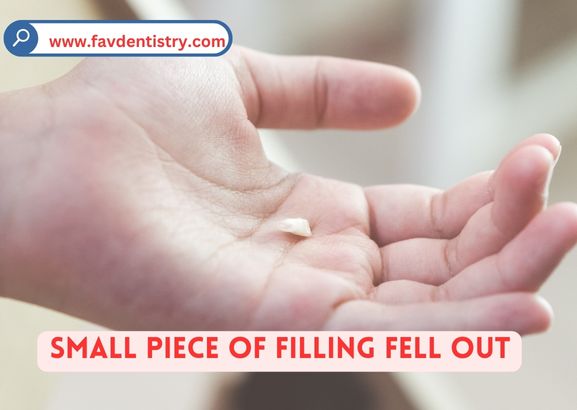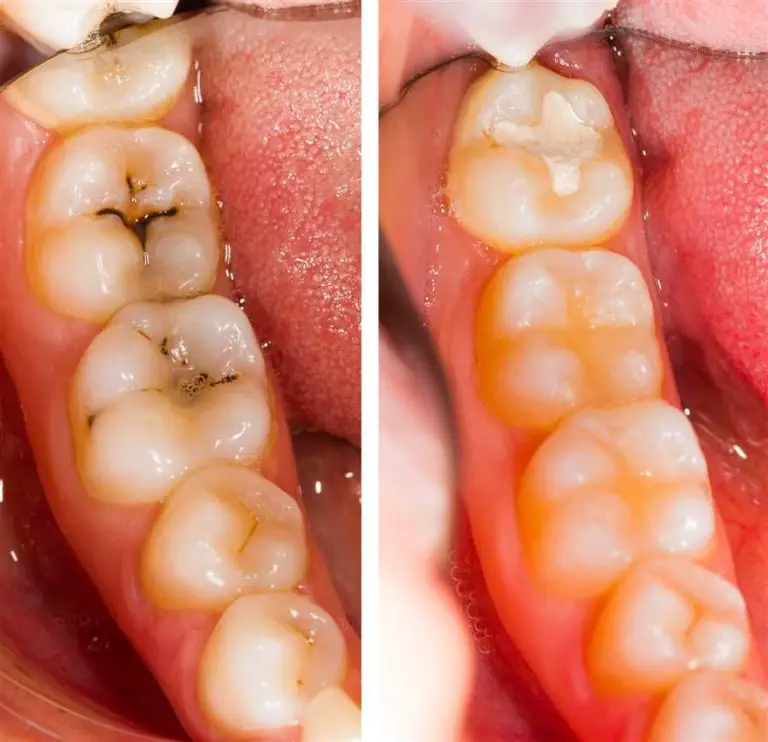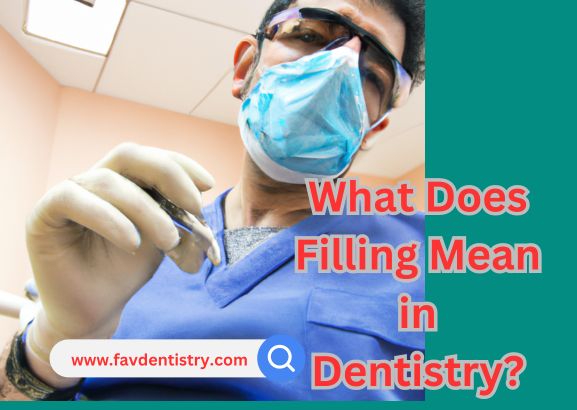Last Updated on 3 weeks by DR. ALBIN SIPES
Teeth filling falling out is a common dental issue that can occur due to various reasons. This article will discuss the causes of teeth fillings falling out, potential complications, and available treatment options.
Teeth fillings can sometimes become loose or fall out due to decay, tooth trauma, biting on hard substances, or poor dental hygiene. When a filling falls out, it can cause sensitivity, pain, and an increased risk of tooth decay or fracture.
If your filling falls out, seeking dental attention immediately is important. The dentist will evaluate the tooth, clean and prepare the area, and provide a new filling or recommend an alternative treatment option. Taking care of your oral hygiene, avoiding excessive force or pressure on the filled tooth, and scheduling regular dental check-ups can help prevent teeth filling from falling out and maintain optimal dental health.
Why Teeth Fillings Are Essential For Dental Health
Teeth fillings are vital for dental health, safeguarding against further decay and damage. Teeth fillings prevent the worsening of cavities and protect the tooth structure. They act as a barrier between the tooth and harmful bacteria that can cause infection.
Without fillings, bacteria can penetrate deeper into the tooth, leading to more extensive damage and potentially requiring more invasive dental procedures. Additionally, fillings restore the tooth’s functionality, allowing for proper chewing and preventing sensitivity. Regular dental check-ups are crucial to detect any signs of fillings falling out or needing replacement.
It is important to address any issues promptly to maintain good oral health. By keeping up with regular dental visits, brushing, and flossing daily, you can ensure the longevity of your teeth fillings and overall dental well-being.
Common Causes Of Teeth Filling Falling Out
Teeth filling falling out can be caused by moisture during the filling process or natural wear and tear. Moisture during the filling process can weaken the bond between the filling material and the tooth, leading to its eventual dislodgement. Over time, the constant pressure from chewing, biting, and grinding can also contribute to the filling falling out.
It is essential to consult a dentist if a filling falls out, as leaving the tooth exposed can result in further damage or infection. Dentists can replace the filling and assess the underlying tooth structure to ensure optimal oral health.
Regular dental check-ups and proper oral hygiene can help prevent teeth filling from falling out and maintain overall dental wellness.
Maintaining Good Oral Hygiene
Maintaining good oral hygiene is crucial for preventing teeth filling from falling out. Regular brushing and flossing remove plaque and food particles from the teeth, reducing the risk of cavities. Using fluoride toothpaste strengthens the enamel, making it less prone to decay.
Remember to brush at least twice daily and floss once daily to remove any trapped debris. Additionally, choose a soft-bristled toothbrush and replace it every three months to maintain its effectiveness. Moreover, avoid excessive consumption of sugary foods and beverages, as they can contribute to tooth decay.
In addition, visit your dentist regularly for check-ups and professional cleanings to ensure your oral health is in optimal condition. Following these guidelines can maintain a healthy smile and prevent your teeth from falling out.
Avoiding Bad Habits
Teeth filling falling out can be avoided by avoiding bad habits like chewing on hard objects and grinding teeth. These habits can exert excessive pressure on the teeth, leading to the loosening or dislodging of fillings. It is essential to be mindful of what we put in our mouths and avoid biting down on things like ice, pens, or fingernails.
Grinding or clenching our teeth, especially during sleep, can also cause fillings to fall out. Using a mouthguard at night can help protect the teeth from the harmful effects of grinding. Taking these precautions ensures dental fillings’ longevity and maintains oral health.
Remember, prevention is better than cure when preserving your fillings.
Regular Dental Check-Ups
Regular dental check-ups are crucial for the early detection and prevention of teeth filling falling out. Dental professionals will closely monitor the condition of fillings and take necessary actions. They will ensure that any signs of damage or deterioration are addressed promptly.
These routine check-ups allow dentists to identify potential issues before they worsen and require extensive treatment. By regularly visiting a dentist, patients can minimize the risk of their fillings falling out and maintain optimal oral health. The preventive approach of regular dental check-ups helps individuals avoid costly and time-consuming procedures in the future.
Ongoing monitoring and timely interventions ensure that fillings stay intact and provide long-lasting protection for teeth. Remember to consider the importance of regular dental visits for preserving the integrity of your dental fillings.
Seeking Immediate Dental Attention
Teeth filling falling out? Seek prompt dental attention to assess the extent of damage. Act quickly to avoid complications. Find a skilled dentist to evaluate the situation. Timely intervention can prevent further decay or infection. Get immediate treatment to avoid discomfort and restore oral health.
Don’t delay; take action if your filling comes out to maintain a healthy smile.
Repair Options For Loose Fillings
Teeth filling falling out can be a common issue, but there are options to repair loose fillings. For minor damage, dental bonding is a suitable solution. Applying a tooth-colored resin to the affected area creates a strong bond.
This can help restore the filling’s stability and functionality. However, for more severe damage, a dental crown may be necessary. A crown is a cap that covers the entire tooth, providing strength and protection. It can be made from various materials like porcelain or metal.
Both dental bonding and crowns are effective ways to address loose fillings, ensuring a healthy and functional smile. Remember to consult with your dentist to determine the best option for your specific situation.
Potential Risks And Complications
Tooth filling falling out can result in potential risks and complications, including tooth sensitivity and recurrent decay.
Frequently Asked Questions For Teeth Filling Falling Out
Why Does Teeth Filling Fall Out?
Teeth filling can fall out due to decay, tooth grinding, trauma, or improper placement. It is essential to seek immediate dental attention if your filling has fallen out to prevent further damage and protect the tooth’s integrity.
Can A Filling Fall Out After Years?
Yes, a filling can fall out after years of being in place. Normal wear and tear, biting down on hard foods, or even temperature changes can cause fillings to become loose and eventually fall out. It is crucial to schedule regular dental check-ups to monitor the condition of your fillings.
What Should I Do If My Filling Falls Out?
If your filling falls out, contact your dentist right away. In the meantime, avoid chewing on that side of your mouth to minimize discomfort. Use over-the-counter dental cement or temporary filling material to cover the cavity temporarily and protect the exposed tooth until you can see your dentist.
How Long Does It Take To Replace A Filling?
The duration of the replacement of a filling depends on various factors, including the cavity’s size and location, the procedure’s complexity, and the dentist’s technique. Generally, a filling replacement procedure can take 30 minutes to an hour.
Your dentist will provide a more specific estimate during your appointment.
Is It Normal To Experience Sensitivity After A Filling Falls Out?
It is expected to experience sensitivity after a filling falls out since the exposed tooth may be more sensitive to hot or cold substances. If you’re experiencing sensitivity, use toothpaste formulated for sensitive teeth and avoid consuming extremely hot or cold foods.
Consult your dentist if the sensitivity persists or worsens.
Can A Filling Fall Out Without Any Pain Or Discomfort?
Yes, a filling can fall out without causing pain or discomfort. However, the absence of pain does not mean your tooth is not at risk. It is still essential to have the filling replaced promptly to prevent further damage to the tooth and maintain optimal oral health.
Conclusion
Addressing a falling tooth filling is crucial for maintaining oral health and preventing complications. While ignoring or delaying treatment may be tempting, seeking professional dental assistance as soon as possible is crucial. Dental fillings, when correctly cared for, can last for many years.
However, decay, trauma, or everyday wear and tear can compromise their integrity, leading to their dislodgement. By contacting a qualified dentist, individuals can receive the necessary evaluation and treatment options suited to their situation. Regular check-ups and good oral hygiene practices can also help identify and prevent potential fillings from falling out.
Remember, investing in oral health can save time and money in the long run. So, prioritize dental care and take action when dealing with a falling tooth filling.





